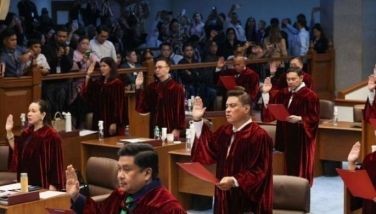Lessons from the Oscar finalists
With the results of the 2013 Academy Awards or Oscars out and everyone either shocked or happy with the results, we chose to zero in on what appeared to be those with the best chances of winning. By this, we meant a film nominated as Best Picture and Best Director in tandem with the Best Screenplay, and from those nominated, only Life of Pi directed by Ang Lee, and Lincoln directed by Steven Spielberg came up to our requirements.
Since we already had seen Life of Pi, we rushed to watch Lincoln, of late garnering much recommendation in terms of media exposure, not to mention an invitation for choice lifestyle columnists to watch the film in the home of US Ambassador Harry K. Thomas Jr.
Last January, we wrote about Life of Pi and found it an epic drama of magic realism in shimmering 3D, often compared to Avatar. We thought this story of a boy and a Bengal tiger spending 227 days together at sea, discovering both God’s beauty and wrath, was meandering and lost our interest most of the time. The Village Voice panned it; The Los Angeles Times called it a “masterpieceâ€; New York Times criticized its narrative frame; The Sun Herald said it was “flawed†but “creativeâ€.
We don’t exactly know how the Academy members would react to this piece that comes across like a gem for some, and pretentious conceit for others. Certainly, those who gave him the Academy Awards in 2005 for the gay romance Brokeback Mountain might be disoriented to say the least.
Lincoln, on the other hand, deals with the last four months in the life of the 16th President of the USA, one of the most admired, who will always be known as the man who abolished slavery, who lost his life to John Wilkes Booth, a confederate sympathizer. The film is directed by iconic Steven Spielberg, known for past Oscar wins of both Best Picture and Best Director in 1994’s Schindler’s List, and again for Saving Private Ryan in 1998. Add to that almost universal acclaim for Daniel Day-Lewis’ portrayal of Abraham Lincoln.
The film was based on the book Team of Rivals: The Political Genius of Abraham Lincoln, written by Doris Kearns Goodwin. It tells of how this principled yet wily politician plays the game of politics that may mean bending rules, yielding to the Confederate enemy, manipulating people to gather votes, utilizing his tremendous charisma and command of words to win a foe over to his side. Yes, he was buying votes although they wouldn’t call it that but by other less compromising names.
When the Congress delivered that all-important vote abolishing slavery by a margin of two votes and the floor bursts into a sea of rejoicing, we found ourselves weeping in our seat at the mall, and exulting with them. This was no longer President Lincoln, but the actor Daniel we were reacting to.
There was only one who remained untouched by all the rejoicing, one who would not succumb to charm and the power of words. This is abolitionist Thaddeus Stevens (Tommy Lee Jones) who remains unflappable in his resolve and distrust of everyone including the President. As he marches out of the session hall alone, reaches his home, throws off his wig and joins his partner in bed, his face changes to one of peace and affection. We love this brooding character who was always present, sat by himself and in a five-minute tour de force unveiled his persona. It was one of our favorite scenes in the film.
Our other favorites were those that show Lincolns’ humanity, with his family, on a carriage with long-suffering wife Mary Todd Lincoln (Sally Field), with his eldest son Robert (Joseph Gordon Levitt) who wants to serve in the army, with his youngest son Tad Lincoln (Gulliver McGrath) who idolizes him and whose screams fill the Ford’s theater at the announcement that his father had been shot. There is also that scene when Lincoln visits the battlefield at Petersburg, Virginia with a sweeping view of all those killed in battle, reminding the audience that this is a film about war.
If there is any defect in Lincoln, the movie, it would be all the talk accompanying the wheeling and dealing. It has been called a master class in restraint, pacing and tone which it may well be. But it is also a master class in politics and reads like a book that titters on the edge of boredom. We didn’t go to the cinema to watch a book being read aloud, we told ourselves. A blog from Stephanie Zacharek of Film.com reminds us Its characters, people who lived long ago… somehow seem to breathe the same air we do.
Yes indeed, our politicians do seem to breathe the same air. This is a film for our current breed, and our current president who is ever being accused of not following the “daang matuwid†(the straight path) he espouses. This is a film for them. We just hope they don’t fall asleep in the process.
(E-mail us at bibsymcar@yahoo.com.)
- Latest
- Trending

































